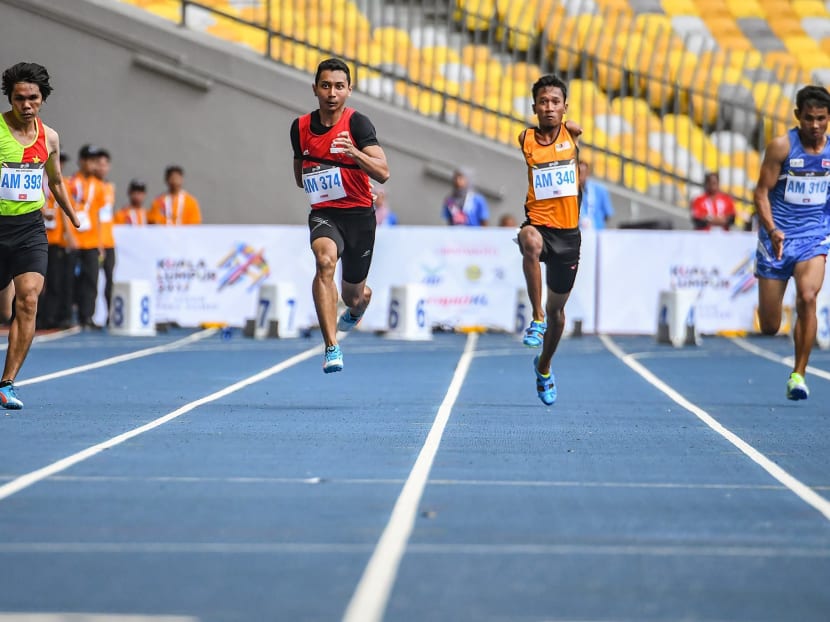S’pore para sprinter Khairi Ishak out of Commonwealth Games after failing drug test
SINGAPORE — In what is a first for the disability sports scene here, national para sprinter Mohammad Khairi Ishak has withdrawn from the ongoing Commonwealth Games in Gold Coast, Australia after testing positive for a prohibited substance.

National para sprinter Mohammad Khairi Ishak (photo, second from left) will miss out on the Commonwealth Games after testing positive for a banned substance. Photo: Andrew JK Tan / SportSG
SINGAPORE — In what is a first for the disability sports scene here, national para sprinter Mohammad Khairi Ishak has withdrawn from the ongoing Commonwealth Games in Gold Coast, Australia after testing positive for a prohibited substance.
The Singapore Disability Sports Council and the Singapore National Paralympic Council said in a joint statement on Thursday (April 12) that Khairi had provided a sample on March 12 this year for out-of-competition testing. It had tested positive for Methandienone, a steroid under the World Anti-Doping Agency’s 2018 Prohibited List.
A hearing was conducted by both organisations on Thursday, and the National Anti-Doping Disciplinary Committee (NADC) will decide on what action to take at a later date.
Khairi, 28, who works as a call centre agent, told TODAY that he had bought a supplement called protein isolate from a Malaysia-based company via its Facebook page at the recommendation of a family member. He was unaware that it contained the banned substance until he was informed this month that he had failed a doping test.
“It was certified halal, and I thought it was just normal protein powder,” he said. “I was very surprised and confused as I could not recall taking any banned substances. The distributor also said it had no banned substances.”
He chose to get the powder online instead of at health supplement outlets because it tasted better, “like Milo”, he added. He also takes two other supplements, creatin monohydrate and fish oil, and buys them from a health store here.
While he was at first scheduled to make his Commonwealth Games debut in the men’s T47 100m final on Friday, the para sprinter was dropped from the competition after testing positive for methandienone, and did not travel to Australia. The anabolic steroid is typically used by athletes, bodybuilders and powerlifters for physique- and performance-enhancing purposes.
The T45 to T47 classes for athletics are for those whose upper limb(s) are affected by limb deficiency, impaired muscle power or impaired passive range of movement.
Khairi, who won silver in the T46 100m at last year’s Beijing World Para Athletics Grand Prix, was involved in a motorcycle accident in 2011 that left his right arm immobile from his fingers to shoulder.
Unlike other major competitions such as the Olympics and Asian Games, which host separate Games for disabled and able-bodied athletes, para sports are integrated into the sports calendar at the Commonwealth Games.
Four para athletes in athletics, powerlifting and swimming were initially part of Team Singapore’s 60-strong contingent in Australia. Khairi is Singapore’s only para representative for athletics.
He said: “I’m disappointed, because from my end, I didn’t think I did anything wrong, and to my knowledge, I didn’t consume anything wrong. It’s confusing because I take care of what I eat.
“I regret a little (buying the powder online), because the supplement intake was my decision.”
Mr Mark Chay, Team Singapore’s chef de mission for the Commonwealth Games, said they were informed by national authority Anti-Doping Singapore that Khairi has been issued “a provisional suspension as a result of a violation charge, hence ruling him out from participating at the Commonwealth Games”.
“We wish to remind all athletes to play a part in clean sport, stay drug-free and to respect the rules in place,” he said.
Khairi has submitted an appeal for his case. Both the Singapore Disability Sports Council and the Singapore National Paralympic Council said that they acknowledged his testimonial that the prohibited substance “could have been stemmed from supplements that he imported from overseas to save costs, despite being unlisted by the manufacturer”.
“Nonetheless, both councils respect the World Anti-Doping Code and the decision of the NADC,” they added.
The councils also advised all athletes that “manufacturers’ assurances” were insufficient proof that they are safe and free from prohibited substances, and that athletes should check their supplements with qualified professionals, or refrain from consuming supplements for recovery.
This is the first time that a Singaporean para athlete has tested positive for a banned substance ahead of a major competition. In 2016, wheelchair sprinter Muhammad Firdaus Nordin was handed a four-year ban for trafficking methamphetamine. The Asean Para Games gold medallist was also jailed five years for drug trafficking and consumption.
There have been previous cases of Singaporean athletes failing drug tests. Former silat world champion Saiedah Said was banned two years in 2013 after testing positive for Nor-Sibutramine and OH-Nor Sibutramine, which are appetite suppressors. Seven bodybuilders also received two-year bans in 2012 after failing doping tests at a competition here.






